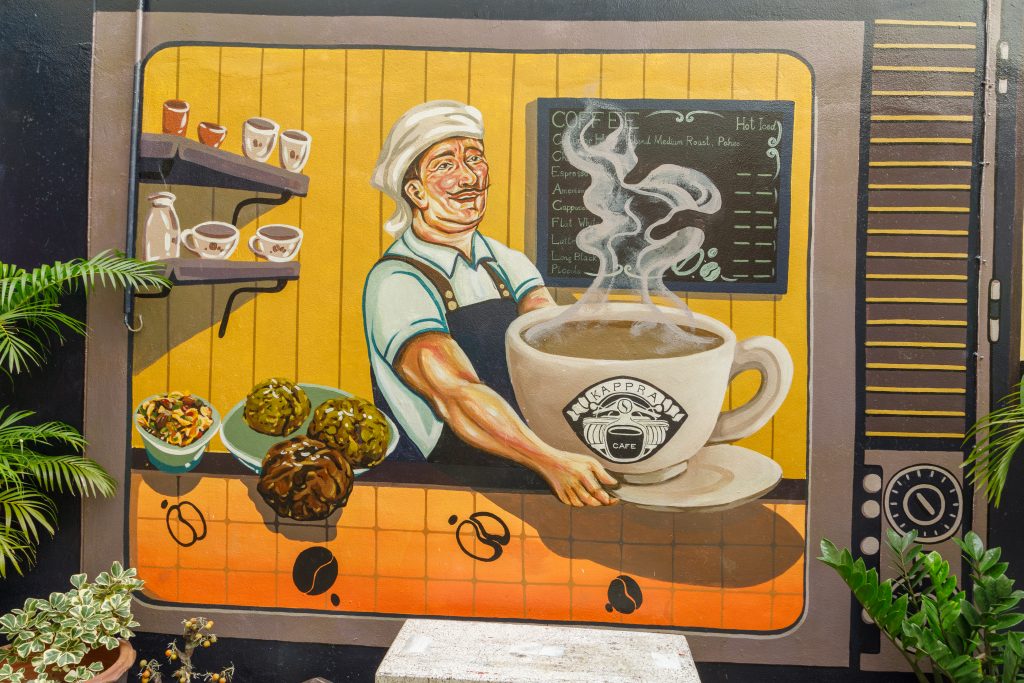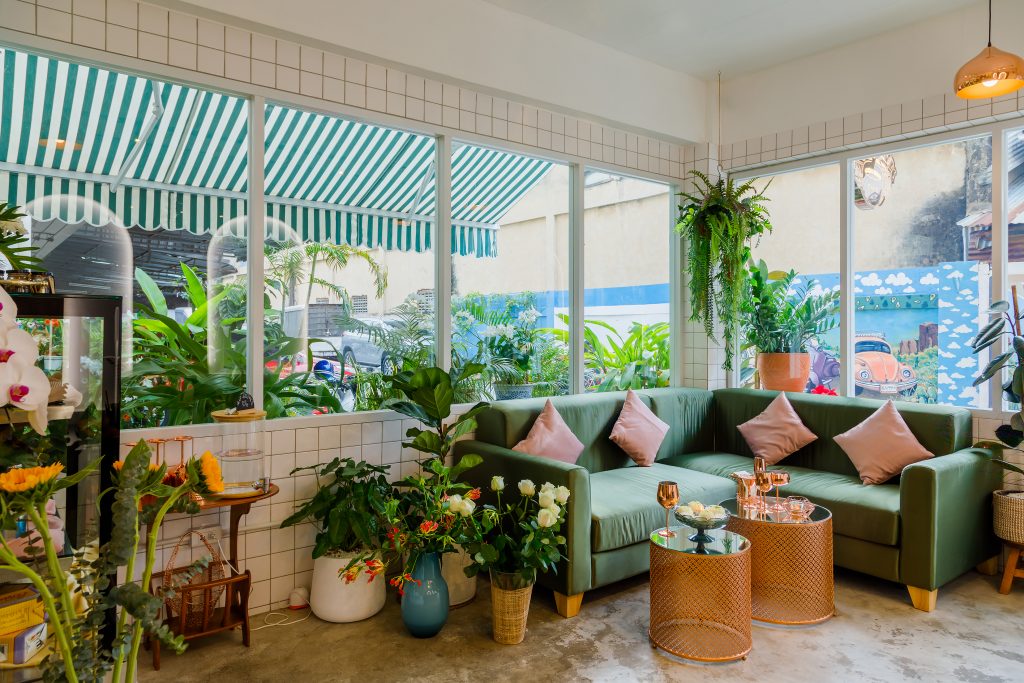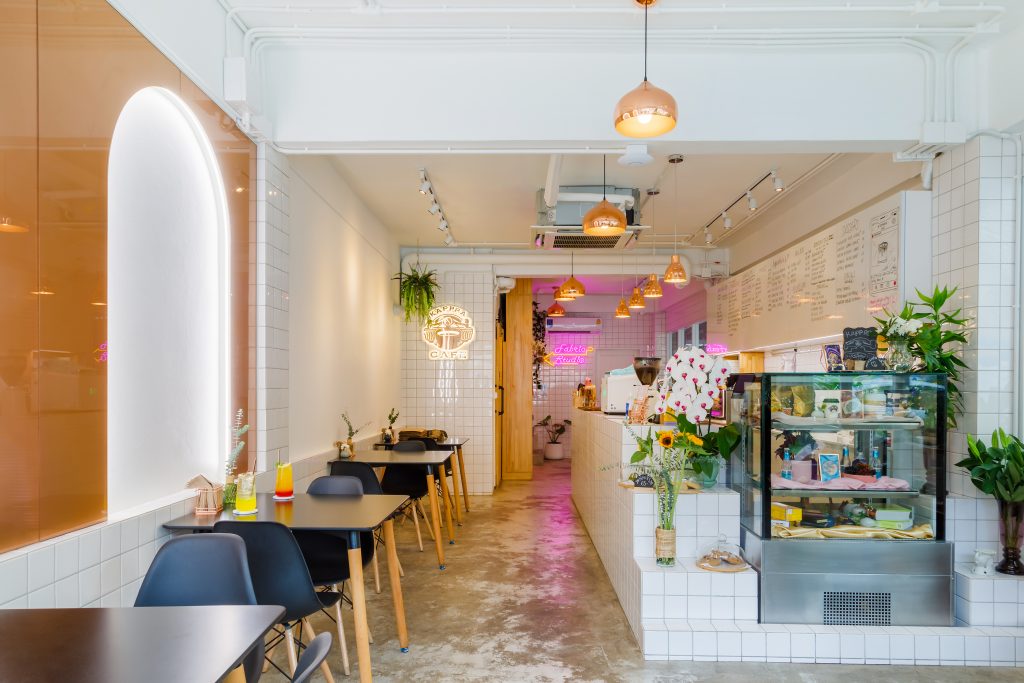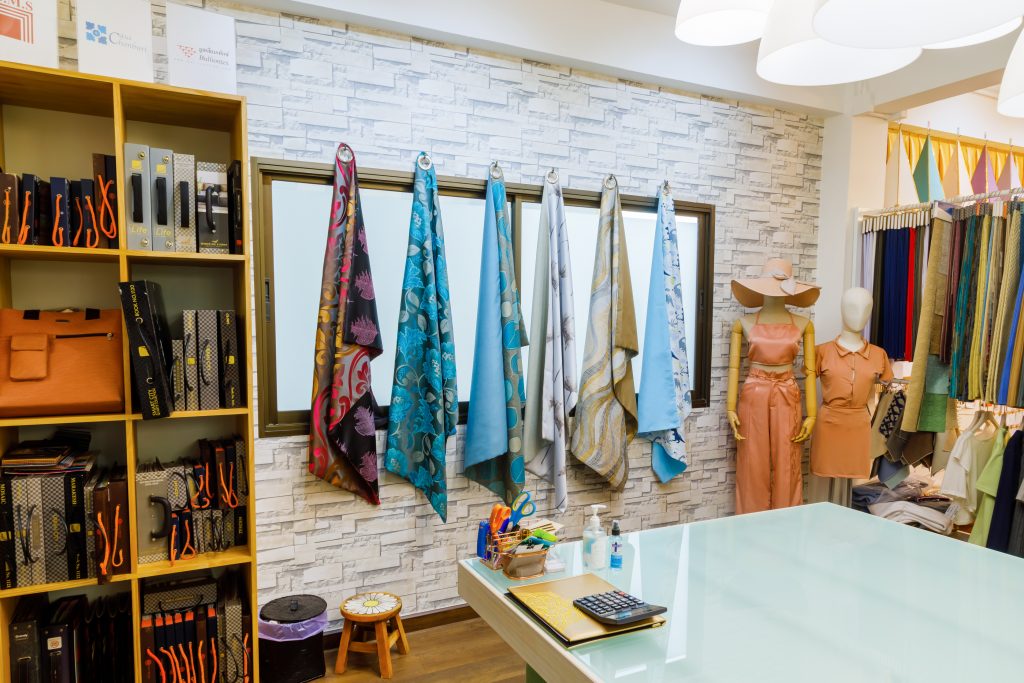How she’s putting the ‘art’ in ‘heart’.
By Aiden Jewelle Gonzales
There’s a university student atop a stool, spray painting an eye-catching mural that’s slowly but surely taking shape beneath her deft hands. As we turn the corner, we’re greeted with a gallery of street art that leads us straight to the front door of Kappra Café, the brainchild of 22-year-old Kulinna Sirikulthada, an impassioned and bubbly young woman who’s spent her gap year from New York University (NYU) bringing to life her vision of a multi-story fabric studio, artistic workspace, sustainable community centre, and vegan café. “It would be an unfair representation to introduce myself as the sole founder of this space, because it belongs to a family of textile companies and factories that my parents and family own,” she says as we sit down to talk about this ode to the area’s cultural history.
Borne out of the “privilege and abundance of time” during the onset of the pandemic, Kappra began life as an idea for a space for artistic innovation, where customers from far and wide could “feel textures, pick colours, and have a chat.” Despite having its grand opening scheduled for December 2021, it served its first cup of (delicious!) vegan coffee over nine months ago, and since then it’s been empowering the community in the historic district of Tha Din Daeng, one that Kulinna’s family has been part of for over two decades. “We’ve spent the year pouring energy and funds into this pierside community with gardening projects, clean-ups, a Diwali and Loy Krathong event, sponsorships of local artists, and so much else,” Kulinna tells me. “We’ve used the institution of Kappra to expose thousands of artists to the science, art and innovation of Thailand’s textile industry.” When asked what motivates her, the answer is immediate and heartfelt: “sustainability, and Thailand’s youth.”
Even from the onset, this is clear in Kappra’s design: the wall of murals in distinctive art styles – an idyllic field of sunflowers in one, a humorous depiction of man and a cow as baristas in another – was created by university students from Poh Chang Academy of Arts, Rajamangala University of Technology Rattanakosin, and Silpakorn University, the closest artistic communities to the café. “They depict each student’s interpretation of sustainability, with evolving ideas on compassion, co-existing with animals, and ways that they would communicate sustainability to the community,” Kulinna explains as she walks us through the long wall of art with pride. “We spoke to third-year university students, who hadn’t graduated yet and didn’t have a portfolio to show us, and told them, ‘we want you to brainstorm a project for us.’ And what they’ve created is incredible. They’ve taken our ideas and even our textile patterns, which they’ve integrated into the art, and they have complete freedom. All I asked is that a picture of my dog had to be up there as well,” she adds with a laugh.
This collaboration funded a portion of the students’ university fees, and also continued inside the fabric studio within the café – a sunlit explosion of wall-to-wall fabric, textures, and art that changes regularly, with vibrant, handmade fabrics arranged into dynamic mood boards, and used to reupholster the furniture. “We plan to host workshops here,” Kulinna says, “the first one being about veganism and sustainability. Eventually, we want to have professors come in and talk about fashion themes, colours, and what’s coming next.”
Downstairs, in the café itself, the modern, brushed concrete flooring is offset by lush amounts of greenery, and outsized windows look out into the garden of potted plants that line the entrance to the fabric cutting studio, which abuts the café. “The ever-growing amount of plants is my favourite design choice in the café,” Kulinna confides. “I give full credit to my mum, who does all the green here. I think plants are so underrated! It brings joy to us to care for them, nurture them and let them heal those who bask in their energy.” Kappra’s colours pull from the green of the plants and marry them with rose gold, black, and white, all seen to best effect in their first floor, from the rose gold industrial lighting, to the black and white coffee bar, and the green couch in pride of place by the windows. “The space’s aesthetic stems from the colour in our food and fabric,” Kulinna says. “And every single piece of fabric is significant to us. We manufacture most of the textiles in this room, and import anything we don’t produce, and we change things up every few months, so there are new colours, textures and ideas to exhilarate artists. The aesthetic is maximalist, and ever- changing.” To that end, a bookshelf by the stairs is filled with books to spark inspiration; what Kulinna calls “nuggets of wisdom from pattern-making books, nutritional books, histories of the art world and design tips.”
When asked where she sources her unique furnishings and furniture, Kulinna fondly recalls how she and her parents drove around Thailand to find the right fit: “We sometimes just watch artisans cut wood, or create furniture, and if it feels right, we talk to them, try to encourage them to create things that they haven’t created before. We’ve even driven up to the North to source, for example, chemical-free, eco- friendly bamboo ladders, which is one of the most sustainable types of wood. Pulling diverse sets of works from different artisans has become a balancing act for us, but we love it. The café is itself a piece of art that is still shaping itself into the community.”
A surprising form of art that Kulinna hadn’t expected was photographers and models coming in droves to take advantage of the photogenic nature of the café, and even the swathes and rolls of fabric in the cutting studio. I point out that they offer a more organic space that is a far cry from the sanitised, Instagram-ready outlets that have popped up all over the city, and Kulinna agrees. “We’re a family of artists, and that’s why there’s just so much art everywhere you look.”
At the end of the day, however, all of Kappra’s design choices come back to the community, and to sustainability, from their compostable takeaway boxes and cups, initiatives to reuse packaging, and ingredients sourced from local farms. “We want to nourish the bodies and souls of everyone who comes here with food that supports the local market, while encouraging artists to use our haven to immortalise the stories of the community through their work,” Kulinna says. Her one advice for anyone looking to do the same? “Don’t underestimate young people who seem unqualified. You must be the head and the heart of the space, but allow creatives to come in to be the skilled hands that execute your ideas.”










